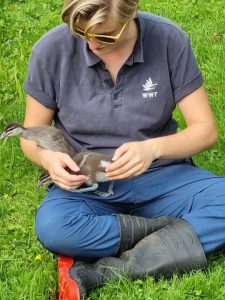Abbie Hobbs graduated in Ecology and Conservation in January 2022. Read her story….
As a very recent Ecology and Conservation BSc graduate, I am sharing how a slightly unusual path through my course gave me a head start on my career.
I started my undergraduate course in 2016 and really enjoyed the wide-ranging content, from micro-biology to behavioural ecology. When a sandwich placement year was offered, I decided it would be a good opportunity to get some work experience before graduating and might help me get an idea of the kind of jobs I could work towards. The careers service was extremely helpful with finding possible placements, writing applications, and preparing for interviews.
Almost immediately after starting as an intern on the reserves team at WWT Arundel in knew that I was incredibly lucky to find myself in the perfect place to add to what I had learned at university from within a functioning nature reserve. I was seeing concepts described in lectures put into practice, for example with species surveys and habitat maintenance. I felt I had found what I was looking for in terms of a career to start working towards, so I worked hard to get as much out of the experience as possible.
When the placement year ended, I was very fortunate to be offered a part-time job as seasonal grounds assistant starting almost immediately. I decided to take my final university year part-time and not miss this opportunity. Being on the grounds team involved looking after public areas (paths, picnic areas etc) but also the captive bird exhibits. Working closely with the keepers revealed a whole new side to WWT Arundel and to wildlife conservation. Rather than maintaining habitats to encourage wild birds, this involved the daily care of captive birds which are part of international breeding programmes helping protect them from extinction. This is not an area I had ever considered as a career as I didn’t have any background in animal care, but this new challenge was another opportunity to keep learning about animal conservation.
Being employed by WWT gave me access to training qualifications that give my CV a huge boost for future jobs. In practical job roles having these tickets, that allow use of certain machinery such as brushcutters or tractors, is often a deciding factor for employers hiring new staff.
This part-time work complimented my studies very well. While I brought a lot of knowledge from the course to my work, I also brought skills from work across to my course. For example I had always struggled with public speaking, but after I started giving regular public talks at the wetlands centre, I gained confidence that helped me feel much more comfortable when giving presentations at university.
In my final year I was able to focus on wetland ecology. I chose modules very relevant to my work at the wetland centre, and for my final year project dissertation was able to undertake my own water vole survey on the reserve.
Taking on extra hours with a casual zero-hours contract meant that I was working full-time in university holidays and covering for staff absences over the pandemic. Balancing this with my final year workload wasn’t easy, but the result was that after two years I have done enough to secure both a 2.1 hons degree and a full-time job almost simultaneously. Very soon I will starting a full-time contract as a Grounds Warden at WWT Arundel, an amazing new role in a place I already have three years’ experience of working.
My Ecology & Conservation course was very career focused, giving me not only the background scientific knowledge required but also how this is put into practice (e.g. through survey techniques, management plans, or data analysis).
If I were to offer some advice to current students or recent graduates it would be to volunteer as much as you can. Getting involved in something is always useful experience even it doesn’t lead to anything further, it is great for your CV and can help narrow down a career choice. Also getting your name and face known will put you in a good position if jobs become available, make sure to let potential employers know how keen you would be for any work. I found the crucial factor in getting my job was getting on well with the rest of the team and my manager knowing I am a reliable, hard-working person.

Published by